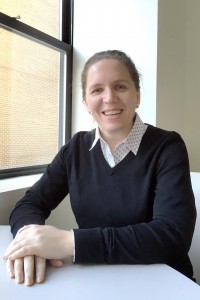I had a fruitful time participating in the DC Exploration Week as a first-year Conference Interpretation student (English-Chinese-Spanish). I only attended four information sessions in my field of study since the rest were only open to citizens/permanent residents or were non-language related. The four organizations I visited were the Inter-American Development Bank, the Organization of American States, the International Monetary Fund, and the World Bank. I also attended the reception on Thursday night at the MIIS DC office. The trip was very informative and valuable. I learned a lot through the info sessions that I would like to share here.
First of all, it was very encouraging to see so many of our alumni in these international organizations.
All of the info sessions I went to had MIIS alumni on their staff. They were very happy to see current students thinking about their careers early on. I only wish there were more MIIS students from the T&I program! We have a relatively large program, but the info sessions had no more than 15 attendees at a time and from only one or two language programs, which was a bit disappointing given how much work the organizations had put into organizing the sessions for us.
Attending info sessions is one of the best ways to conduct research on the organizations.
Our hosts were translation section chiefs, HR directors and senior program managers, among others. Their hour-long info sessions usually stretched into an hour and a half and in some cases two hours, as they gave us crash courses on their organization and how their language units worked (and some even showed us the booths!). Some of them even gave us answers to questions that we may be asked in interviews. Although I put a few hours into researching the organizations prior to attending, nothing came close to being as helpful as talking to people who actually work there. The alums were especially cordial and some shared with us their contact information.
It’s a long and winding road to becoming a staff interpreter/translator at an international organization, and our best way to proceed is to hear early how to prepare from the staff themselves.
As I discovered during the past few days, in-house opportunities at international organizations are few and getting fewer (due to budget cuts proposed by the new administration and the growing trend of outsourcing around 70% of their translation and interpretation work). There is also a gap between most students’ professional capacity and the level required for international organizations, which look for mid-career professionals. So here comes the catch-22 regarding experience: how do you get experience when nobody wants to hire you if you don’t have any? Fortunately, there is a way out. Our alums at the World Bank (WB) specifically pointed out that we needed to (1) get our foot in the door, (2) have specialized knowledge in a field (or more) other than languages, and (3) get the right kind of exposure.
Regarding (1): one of the alumni started as an assistant photo editor at one of the international organizations on a short-term contract, and another worked on text alignment. At first, they were not thrilled about having graduated from MIIS and having to do something unrelated to their training and aspirations, but they stuck with it, let the higher ups know about their core skills, and eventually got the positions they wanted.
Regarding (2): with 70% of the T&I work outsourced, the language departments at international organizations are functioning less like translation/interpretation teams and more like LSPs within their own organizations. For example, one of the biggest “requesters” (in WB lingo) for WB’s language services is ICSID (International Center for the Settlement of Trade Disputes, part of the World Bank Group), and the interpretation chief emphasized that they look for people who can work at the conference level, bi-directionally, and with specialized knowledge in economics and law. The specialized knowledge does not have to come from formal training – reading books, researching, and teaching ourselves are all essential to becoming a good translator/interpreter.
Regarding (3): for students with no experience in the field, volunteering can be a good start. TED has subtitling opportunities and Translators Without Borders offers a chance to practice language skills while contributing to a good cause. Gradually, one should aim for higher-profile work (the T&I world is very small and word of mouth matters a lot). It is also important to get to know the chief interpreters/translators (the people at the international organizations who staff their events and translation teams) – sending résumés and asking about freelance opportunities is a good way to make initial contact, since these organizations are constantly seeking to expand their rosters. Some will give tests (in which case, do not shy away!) and some will rely on recommendations by senior professionals they have worked with before, so it is important to start early and build a portfolio.
Lastly, skills other than translation/interpretation itself are becoming increasingly important. Many international organizations are working with CAT tools (many of them are transitioning to the UN’s own CAT-tool, eLUNA), and they recommend getting familiar with as many kinds as possible. Terminology management is also important – although it seems like no organization aside from WIPO looks for terminologists, most expect translators and interpreters to contribute to terminology management. Being able to work in teams is indispensable – translation departments at international organizations process over a dozen million words per year, and to be a successful translator, one has to know how to collaborate with colleagues (in addition to working under tight deadlines, being meticulous about details, and being able to revise their own work, among others).
Personally, I found the info sessions very helpful – I had already applied to internships at two of the organizations by the time I attended the sessions, and since international organizations tend to move very slowly, it was also my chance to express my interest and gently nudge them to look out for my application.
Final advice I have for future attendees:
- Use the student & alumni reception as a great networking opportunity. Swap a few cards with your friends/classmates so that you advertise for each other and work more efficiently (wish I thought of this earlier!). Plus, looking out for each other is not just the right thing to do; it will bring good professional “karma.”
- Showing up is half the success. Try to go if you have an opportunity. How else would you stand out among the thousands of applicants to the few dozens of internship opportunities? Once you can have them put a face to a name, you are already ahead of the game.
- Do not be afraid to ask questions and talk with the presenters after the info session. The organizers appreciate thoughtful questions, and especially if they are MIIS alumni, they want to see you succeed.
- Of course, dress professionally and think of yourself as a young professional. Don’t feel intimidated (guilty as charged but I will improve next year)!
Zilin Cui
MACI 2018
Middlebury Institute of International
Studies at Monterey




